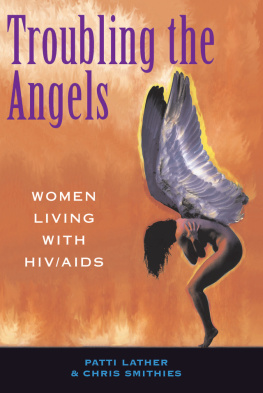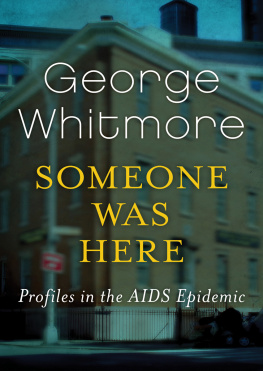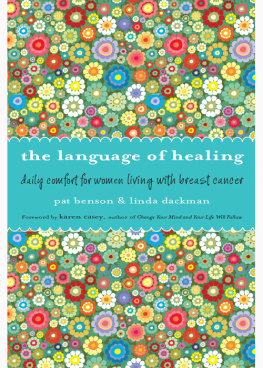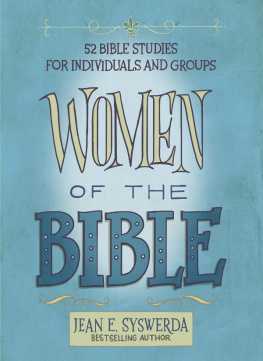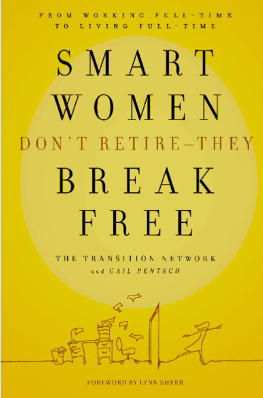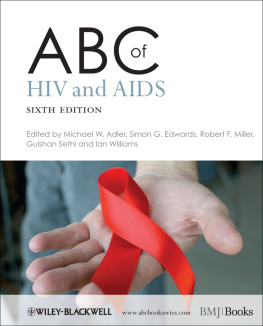Troubling the Angels
Troubling the Angels
Women Living with HIV/AIDS
Patti Lather and
Chris Smithies
First published 1997 by Westview Press
Published 2018 by Routledge
711 Third Avenue, New York, NY 10017, USA
2 Park Square, Milton Park, Abingdon, Oxon OX14 4RN
Routledge is an imprint of the Taylor & Francis Group, an informa business
Copyright 1997 Taylor & Francis
All rights reserved. No part of this book may be reprinted or reproduced or utilised in any form or by any electronic, mechanical, or other means, now known or hereafter invented, including photocopying and recording, or in any information storage or retrieval system, without permission in writing from the publishers.
Notice:
Product or corporate names may be trademarks or registered trademarks, and are used only for identification and explanation without intent to infringe.
Library of Congress Cataloging-in-Publication Data
Lather, Patti, 1948
Troubling the angels: women living with HIV/AIDS /Patti Lather,
Chris Smithies.
p. cm.
Includes bibliographic references (p. ).
ISBN 0-8133-9016-8
1. AIDS (Disease)Sex factors. 2. WomenDiseases.
I. Smithies, Chris II. Title.
RC607.A26L377 1997
362.1'969792'0082dc21 97-3989
CIP
Internal design and typesetting: Letra Libre
ISBN 13: 978-0-8133-9016-1 (pbk)
For Rex, PAL
For Elena, CSS
How do we get people who are afraid of us to hear this stuff?
Linda B
I was going to die before I got HIV.
Sandy
I have laughed more, cried more and eaten more than at any other time in my life.
Chris
It's OK to be a positive woman.
Joanna
(To Patti) You've grown so much and gotten a lot smarter than when I first met you at the AIDS retreat.
Amber
When are you guys going to publish? Some of us are on deadline, you know.
Linda B
- David Adams, Flying Woman: And She Still Rises (1995)
We are profoundly grateful to the women whose stories we tell here. For all the obvious and many not so obvious reasons, there would be no book without them. They gave time and insight to the lengthy interview process and privileged us with the most personal aspects of their lives. We are simply and deeply touched by their trust and hope.
This research was funded through two Ohio State University sources, the Elizabeth Gee Fund for Research on Women, 1993, and the Coca Cola Grant for Research on Women, 1995. Fieldwork and interview transcription costs were supported by an Ohio State University Seed Grant, 1992, a College of Education Small Research Grant Award, 1993, and a particularly timely cash infusion from Jim Pearsol, former Director of the East Central AIDS Education and Training Center. We thank Jim, too, for introducing us to one another and launching our research partnership.
Nancy McDonald Kenworthy of Athena's Press and Jon Brooks of Letra Libre were angels of desktop publishing and Jill Rothenberg of Westview Press helped us learn to live with the twists and turns of the publishing world.
We are grateful to the artists who have let us use their work, the community service associations that sponsor the support groups, the group facilitators, and the many members of our families and friendship circles who have stood with us through the time of bringing this book to fruition.
On behalf of the women of this book, we are pledging one-third of the royalties of this publication, after production costs, to organizations that help women and their families live with HIV/AIDS.
Patti Lather
Chris Smithies
The angel handed me a book saying, "It contains everything that you could possibly wish to know." And he disappeared.
So I opened the book, which was not particularly fat.
It was written in an unknown character.
Scholars translated it, but they produced altogether different versions.
They differed even about the very senses of their own readings, agreeing upon neither the tops nor the bottoms of them, nor upon the beginnings of them nor the ends.
Toward the close of this vision it seemed to me that the book melted, until it could no longer be distinguished from this world that is about us.
(Paul Valry, quoted in Carolyn Forch's book of poems, The Angel of History, 1994)
Preface 1
The Book
AIDS is on the rise among women in the United States, especially poor African American and Latina urban women. This book explores the cultural meanings and social ramifications of the experiences and understandings of a particular grouping of women who live with the disease. Found in support groups, they both are and are not representative of the larger population of US women infected with HIV. To listen to these women deal with the disease and their experiences of the sea changes that HIV/AIDS brings to living suggests what it means for each of us to address similar issues in meeting what we cannot know: death and the future we make present in the way we live our lives. As witnesses to the women's courage and struggle, our hope is that this book will support, inform, and trouble its various readers as well as make visible the work of living with HIV/AIDS.
By raising such emotionally charged issues as death, survival and self-determination, this book walks a fine line between making a spectacle of these women's struggles and a wanting to speak quietly, with respect for all that it means to tell the stories of people willing to put their lives on public display in the hope that it will make it better for others. Charting the journey of their struggles with the disease, from initial shock to getting on with their lives in ways that make time for what matters often results in admiration for those who are HIV+. Their vibrancy and hopeful realism are lessons in living. Their journeys from infection to symptom to sickness to wasting to death are studies in what it means to be "wise before their time." Their willingness to let us into their lives as witnesses to their struggles has touched us both in ways that we will elaborate upon in what follows. But before getting into their stories and our stories of listening to and then telling their stories, we want to say a few words about this book.
The question of what this book is can be approached by talking about what it is not. This is NOT a chronicle where we as researchers record events as unobtrusively as possible. The book is laid out so that, rather than only "giving voice" to the stories of others, this is also a book about researchers both getting out of the way and getting in the way. As filters for the stories that we heard, we have written a book that is about others who both are and are not like ourselves, as we give testimony to what are our own stories and larger than our own lives. Telling of a loss beyond naming where we try to know from the inside what is our outside, a threshold between what we know and what is beyond our knowing, this book, then, is about the limits of what can be said and known about the lives of others. Doing this work as both a service and a learning, our challenge has been to risk the necessary invasions and misuses of telling other people's stories in order to bear witness with fierce but unsentimental conviction that such stories can transfix, overwhelm, linger, and compel in taking readers to the place where this research has brought us, a place where we can see all the "truth" that we can handle and be grateful for it.

